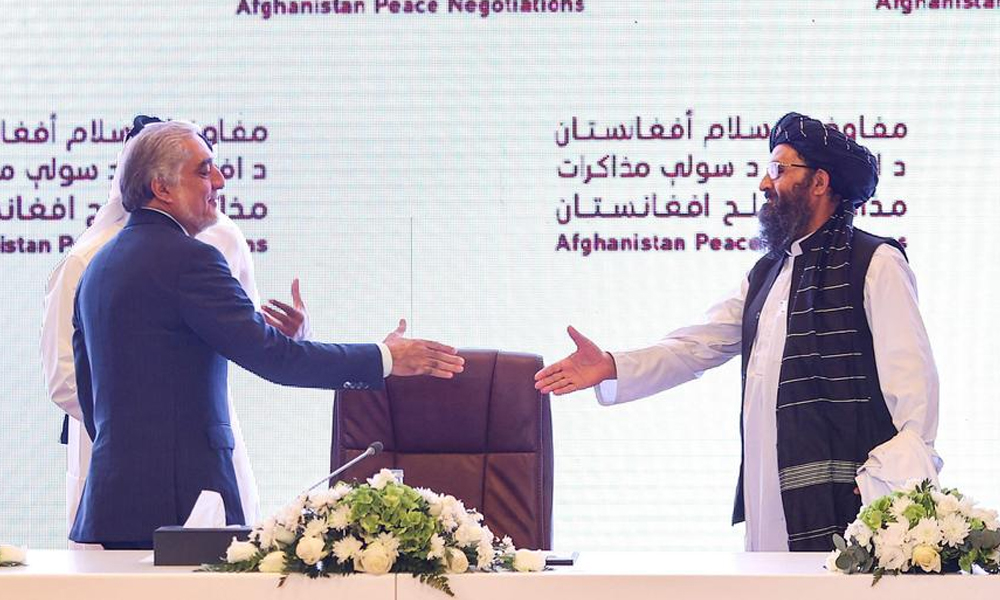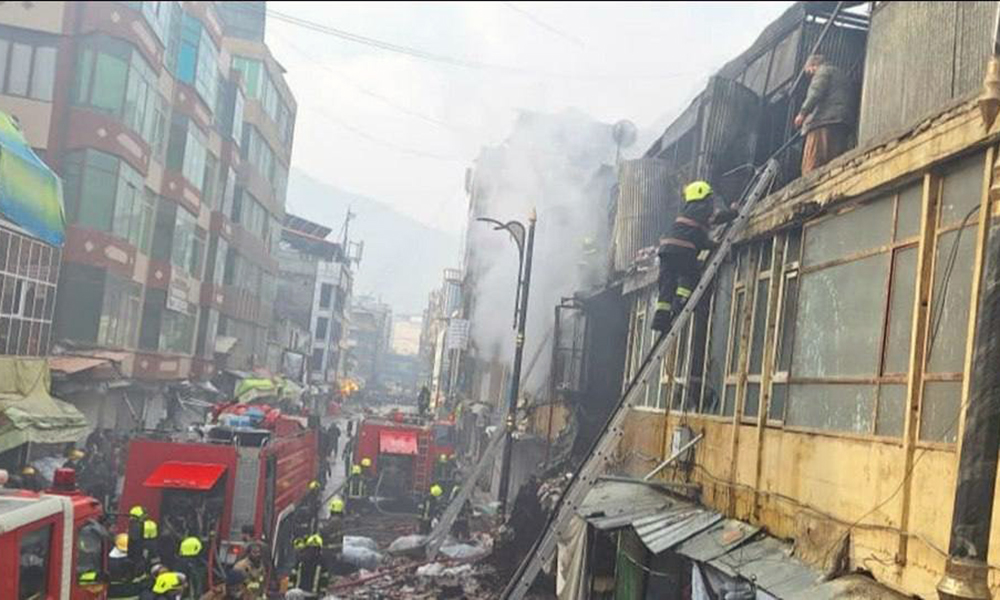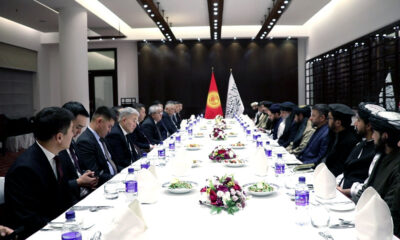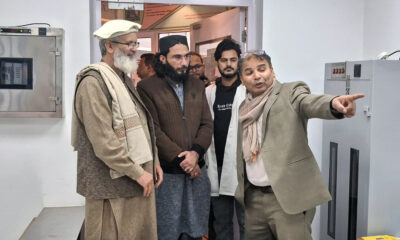Latest News
Time for both sides to stop fighting and make a deal, say foreign stakeholders

US Special Representative for Afghanistan Reconciliation Zalmay Khalilzad and UNAMA both issued a communique on Saturday calling on both sides to the conflict to stop the fighting and start making progress at the peace talks tables.
The communique comes after a meeting on Thursday in Rome between the EU, NATO, the UK, France, Germany, Italy, Norway, and the US, where they discussed the situation in Afghanistan and the developments in peace negotiations after last week’s high-level talks in Doha.
The communique stated the group of countries and organizations are committed to a strong partnership with Afghanistan and will be closely monitoring ongoing developments during the new phase of transition as foreign troops withdraw.
They said they “are deeply concerned about the high levels of violence, the Taliban’s military offensive, and the number of reported serious human rights abuses and violations alleged in communities most affected by the ongoing armed conflict across the country”.
“We call on all parties to reduce violence and protect civilians, respecting their obligations under international humanitarian law.
“We call on the Taliban to end their military offensive, and on both the Islamic Republic and the Taliban to engage meaningfully in the peace process.
“We reiterate the urgency of reaching a ceasefire to ensure the success of negotiations, and we acknowledge the sacrifices of the Afghan security forces,” the communique read.
The group also stated that they reaffirm there is no military solution to the conflict in Afghanistan and that it will not support any government in Afghanistan imposed through military force.
In addition they said that five elements of a final political settlement are critical to continued support. These are: 1) inclusive governance; 2) the right to elect political leaders; 3) protections for human rights, including rights of women, youth and minorities; 4) commitments on counter-terrorism, including to ensure that Afghanistan does not again serve as a safe haven for terrorists; and 5) adherence to international law, including international humanitarian law.
“We emphasize that international support to any future government will depend, at least in part, on adherence to these five elements,” the communique read.
“We also reiterate that future assistance to Afghanistan is dependent on good governance and a commitment to the rule of law and human rights, including preservation of the gains made by women and girls over the past two decades, as well as the government taking meaningful steps to tackle corruption and to meeting commitments made at the November 2020 Geneva Conference.”
The group also welcomed the talks held in Doha last week between senior leaders of the Afghan Republic and the Taliban and stated: “We further welcome the declared commitment of the two sides to accelerate negotiations toward an inclusive political settlement and to meet again in the near future. We believe future meetings should focus on core issues that will be fundamental to reaching an inclusive political settlement.”
They stated however that they are aware that reaching a final political settlement, including on the Constitution, will likely take time but urged both sides to agree to a permanent and comprehensive ceasefire, to foundational principles for the future Afghan State, and on details of transitional governing arrangements.
The group also called on both parties to negotiate in good faith in order to reach a just and durable political settlement.
The group also commended Qatar for bringing the parties together and for its overall contribution to the peace process.
In addition, the group said they encourage Afghanistan’s neighbors to intensify their support to the Afghan people and to contribute to a lasting peace settlement and economic development in the interests of all.
“We also call upon all parties to ensure the safety of foreign embassies and other diplomatic missions, multilateral agencies, media representatives, airports and non-governmental organizations and their Afghan and international staff.”
We particularly appreciate Turkey’s readiness and commitment to assist with airport security as needed.
Latest News
Afghanistan signs 30-year deal for marble mining in Daikundi

The Ministry of Mines and Petroleum of Afghanistan has signed a 30-year agreement with a private company to extract marble in Daikundi province.
Under the contract, the company will invest AFN 283 million in exploring and mining marble at the “Mesh-Uliya” site, spanning 16.74 square kilometers in central Daikundi.
Hedayatullah Badri, Minister of Mines and Petroleum, stated that the marble will be processed domestically before being exported abroad. He added that the Mesh-Uliya project is expected to create around 200 jobs, and the company is committed to supporting local communities through social initiatives.
Economic experts highlight that such investments, especially those focusing on domestic processing, are crucial for job creation, boosting exports, and strengthening the national economy. Analysts further note that the project will improve local infrastructure, expand social services, and enhance the economic and social well-being of Daikundi residents.
Since the return of the Islamic Emirate to power, efforts to develop Afghanistan’s mining sector have intensified, with multiple contracts signed in areas including cement, copper, iron, and lapis lazuli, involving both domestic and international companies.
Latest News
Passenger bus veers off Salang Highway, leaving 5 dead, dozens injured
Latest News
Major fire in Mandawi Kabul market contained, extensive losses prevented
Local shopkeepers said the fire broke out around 4 a.m.

The Ministry of Interior reported that personnel from the General Directorate of Firefighting and Emergency Response successfully prevented the further spread of a fire at Mandawi market on Kabul early Sunday morning.
Abdul Mateen Qani, spokesperson for the ministry, said that the fire destroyed 10 storage facilities and 8 shops. He added that initial losses are estimated at around $700,000, but timely action by firefighting personnel saved property worth approximately $2.2 million.
Qani explained that the fire was caused by an electrical short circuit. He praised the rapid and effective containment operations, which prevented more extensive damage.
Local shopkeepers said the fire broke out around 4 a.m.
-

 International Sports5 days ago
International Sports5 days agoIPL 2026: Teams take shape after auction as franchises balance star power and depth
-

 International Sports5 days ago
International Sports5 days agoILT20: Abu Dhabi Knight Riders end Desert Vipers’ unbeaten run in dramatic one-run win
-

 Latest News3 days ago
Latest News3 days agoAfghan border forces prevent illegal entry of hundreds into Iran
-

 Latest News2 days ago
Latest News2 days agoPakistan summons Afghan diplomat over deadly attack in North Waziristan
-

 Business5 days ago
Business5 days agoMahirood Customs leads Iran’s exports to Afghanistan
-

 Latest News5 days ago
Latest News5 days agoAfghanistan, Kyrgyzstan discuss expanding trade and economic cooperation
-

 Latest News3 days ago
Latest News3 days agoJapan allocates nearly $20 million in humanitarian aid for Afghanistan
-

 Latest News2 days ago
Latest News2 days agoKarzai urges reopening of girls’ schools and universities for Afghanistan’s bright future

























